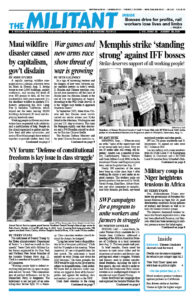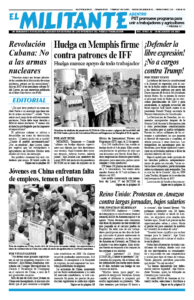MANCHESTER, England — Striking members of the Rail, Maritime and Transport Workers union were joined on picket lines by disability rights campaigners and other trade unionists in many parts of the country during one-day strikes by 20,000 rail workers on July 20, 22 and 29.
Weeks before, rail bosses had announced the closure of almost all station ticket offices, cutting more than 2,000 jobs. Both the RMT and the Associated Society of Locomotive Engineers and Firemen held a series of strikes over the past year. The government and rail bosses demand unions accept job cuts and attacks on working conditions to get higher pay.
A July 18 meeting of over 100 people organized by Manchester RMT branches was addressed by Mick Lynch, the union’s general secretary; members of disability rights groups; and Andrew Burnham, mayor of Greater Manchester.
The fight against the ticket office closures is “about humanity, accessibility and we are determined to win,” RMT regional organizer Craig Johnson said. Train company Avanti West Coast has already announced 192 redundancies, Johnson said, despite claims by rail bosses that workers would be relocated.
“No one will be there to help us with ticket machines,” Kevin Greenham from the National Federation for the Blind told the meeting. Only 3% of visually impaired people say they can use a ticket machine.
Workers need a labor movement that is not just about the world of work, Lynch told the meeting, but one “that goes into our communities, we’ve got to stand together.”
The Rail Delivery Group, an organization of rail company bosses, “says it is modernizing,” said Rick Burgess, a member of the Greater Manchester Disabled Peoples Panel. “There’s nothing modern about excluding disabled people from public transport.” He urged participants to join RMT picket lines.
“I see this first of all as a fight for jobs,” said Janine Cantwell, a Rail, Maritime and Transport member and dispatcher at Manchester Victoria station. Rail workers had received no pay raise for years, she added, and closing ticket offices or reducing their hours would make it harder for older people to get reduced fares. The RMT is demanding a pay raise to match inflation.
Mark Porter, union convener at Rolls Royce in Barnoldswick, Lancashire, gave greetings to the meeting from Unite, noting that members of the RMT joined the picket line of Rolls Royce workers in 2021. “This is an attack on the most vulnerable,” he said. “We stand together.”
Through fights like this, unions can challenge decisions taken “by those driven by profit, instead of those of us who work on the railway and the working people who use it,” said Pete Clifford during the discussion. Clifford is an RMT member and train dispatcher at Manchester Piccadilly station and the Communist League candidate for Manchester Central in next year’s general election.
During the discussion I pointed to the fight waged by residents of East Palestine, Ohio, and rail unions in the U.S., to make the Norfolk Southern rail company take responsibility for the damage caused by the derailment and spillage of toxic chemicals there in February. Rail bosses had cut jobs, endangering the lives of workers and those living near the tracks, highlighting the need for unions to fight for control over safety, I said.
The RMT has called further strikes for Aug. 26 and Sept. 2.
Anne Howie is a member of the RMT at Manchester Piccadilly station.

